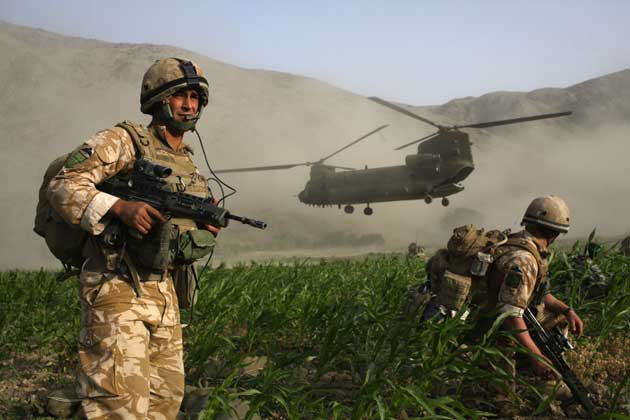Forces may have to rent helicopters

Your support helps us to tell the story
From reproductive rights to climate change to Big Tech, The Independent is on the ground when the story is developing. Whether it's investigating the financials of Elon Musk's pro-Trump PAC or producing our latest documentary, 'The A Word', which shines a light on the American women fighting for reproductive rights, we know how important it is to parse out the facts from the messaging.
At such a critical moment in US history, we need reporters on the ground. Your donation allows us to keep sending journalists to speak to both sides of the story.
The Independent is trusted by Americans across the entire political spectrum. And unlike many other quality news outlets, we choose not to lock Americans out of our reporting and analysis with paywalls. We believe quality journalism should be available to everyone, paid for by those who can afford it.
Your support makes all the difference.British forces are so short of helicopters in Afghanistan and Iraq that they are considering renting them from other countries, or even from the controversial US security contractor Blackwater.
As a roadside bomb in Afghanistan's Helmand province claimed the life of another UK paratrooper, The Independent has learnt that the Ministry of Defence will hold a crisis meeting at 5pm today to discuss leasing helicopters from former Warsaw Pact countries as well as commercial companies.
Chaired by the Defence Secretary Des Browne, the summit will be attended by senior military and government personnel who will be expected to solve the acute helicopter shortage.
Nato, but not Britain directly, is believed to be negotiating with Blackwater, which has come under fierce criticism from the Iraqi government and the US Congress after 17 civilians were shot dead in Baghdad last year. Another option being explored by the MoD is leasing Cougar helicopters from oil companies involved in offshore production.
Two more soldiers were killed this week in Helmand, bringing the British death toll in Afghanistan to 114, with 340 injured. The vast majority of casualties in a recent sharp rise have been caused by roadside bombs and suicide bombers. Soldiers are forced to travel by road because of the lack of helicopters.
Analysts point out that in South Armagh in the early 1980s the prevalence of IRA roadside bombs caused all movements by the British military to be undertaken by helicopter – 70 aircraft were supplied. Helmand, which is six times bigger than Northern Ireland, has just 16 passenger helicopters.
The British force in Helmand is supported by eight Chinooks (up to 40 passengers) and four Royal Navy Sea Kings (up to 10). Four Army Air Corps Lynx helicopters are also based in Helmand, but cannot fly between 11am and 11pm in the summer, the traditional fighting season, because of the effect the heat has on their engines. There are also eight Apache gunships, but they cannot carry passengers. When the USSR occupied Afghanistan it had 1,000 helicopters to support and supply its troops.
Today's summit was ordered by Mr Browne, who is said to be "very aware" of the problem and wants answers before the summer holidays. He has also said he wants urgent action. A senior military officer said: "The problem with helicopters is something we need to address and we are grateful the Secretary of State is taking it seriously. We can say it is not purely a UK problem and other Nato countries in Afghanistan should contribute more. But in the meantime it is British soldiers who are dying."
Tony Blair promised two years ago that commanders on the ground would be given any "equipment, armoured vehicles for example, more helicopters" that they wanted. Yet cost-cutting has forced the Army Air Corps to plan the closure of a Territorial Army regiment, grounding 22 Gazelle helicopters and 78 pilots. Meanwhile, eight Chinook helicopters ordered from Boeing and destined for special forces lie idle in hangars in south-east England after the RAF found that they were airworthy only above 500ft and in clear conditions. It has taken Boeing and the MoD five years to come up with a solution. The Chinooks will enter service in 2011 at an additional cost of £250m.
Today's MoD meeting takes place as the 3 Commando Brigade, led by the Royal Navy's Marines, took part in their final exercise before departing for Helmand. The troops will raise the total of British forces in Afghanistan to more than 8,000, the highest ever number in the country, and almost double the size of the force now in Iraq.
Brigadier Buster Howes, Commander of the 3 Commando, said: "If they offer me more helicopters would I take them, of course I would." However, he said that the resources available at present would be adequate for him to carry out his mission.
Brigadier Howes said: "Is Helmand a dangerous place? Of course it is, the fatalities prove that is the case. Are we aware of that? Yes of course we are. Are the people going out in this brigade deterred by this? No they are not."
Subscribe to Independent Premium to bookmark this article
Want to bookmark your favourite articles and stories to read or reference later? Start your Independent Premium subscription today.
Join our commenting forum
Join thought-provoking conversations, follow other Independent readers and see their replies
Comments